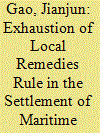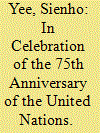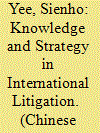| Srl | Item |
| 1 |
ID:
178014


|
|
|
|
|
| Summary/Abstract |
The delimitation process has conceptually been considered to reflect preexisting maritime boundaries. This arises as the delimitation has not been seen to result in de novo lines as the delimitation process has been conceived as a declaratory exercise that necessarily arises from the ab initio nature of coastal States’ rights to the continental shelf. The International Court of Justice and Annex VII arbitral tribunals have followed a declarative understanding of delimitation. Accordingly, the extraction of hydrocarbons by a third State in a yet un-delimited area, which, pursuant to a judicial decision, would be recognized to be part of the continental shelf of the neighboring State, should, it is reasonable to assert, constitute an international wrongful act under international law and engage the international responsibility of the relevant State(s), except if authorized expressly by the relevant coastal State. This a priori uncontroversial understanding appears revisited by the Special Chamber of the International Tribunal for the Law of the Sea in the Ghana/Côte d’Ivoire case. According to the Special Chamber the delimitation consists in giving one entitlement priority over the other and therefore the delimitation of the continental shelf has a constitutive nature rather than declaratory. The approach of the Special Chamber can give rise to numerous intricate legal questions that may arise in future delimitation cases.
|
|
|
|
|
|
|
|
|
|
|
|
|
|
|
|
| 2 |
ID:
178013


|
|
|
|
|
| Summary/Abstract |
The exhaustion of local remedies (“ELR”) rule is applicable in the settlement of maritime disputes, and it is not limited to the case of diplomatic protection. So far the manner in which the tribunals under the UN Convention on the Law of the Sea dealt with the ELR issue in the cases of the flag State’s protection has raised the concern that the rule may become a dead letter in practice. Although the cases involved the protection of natural and legal persons by States, the tribunals rejected the objections to the admissibility of claims raised by the respondents based on the ELR rule in all cases. However, the approaches in which the tribunals dealt with the ELR issue are questionable, and the practice of the International Tribunal for the Law of the Sea contains dual imbalances. In the case of a mixed claim, the preponderance test suggested by the International Law Commission should be employed to determine the nature of the plaintiff’s claim as a whole. The test was mentioned in several cases, but it was not used correctly.
|
|
|
|
|
|
|
|
|
|
|
|
|
|
|
|
| 3 |
ID:
178015


|
|
|
|
|
| Summary/Abstract |
In July 2019, the Hague Conference on Private International Law adopted the Convention on the Recognition and Enforcement of Foreign Judgments in Civil or Commercial Matters. As an outcome of the Judgments Project, this Convention will exert a great influence on the global circulation of foreign judgments. China attached great importance to the Judgments Project and participated in the full negotiation process. This paper is a reflection of some of the Chinese negotiators’ approaches in handling certain very difficult but important issues in the process, with the hope that it may shed some light on China’s negotiation practice and the principles it adheres to in the international law arena, which are fully in line with the principles of equity and justice, mutual benefit, and win-win outcome.
|
|
|
|
|
|
|
|
|
|
|
|
|
|
|
|
| 4 |
ID:
178010


|
|
|
| 5 |
ID:
178016


|
|
|
|
|
| Summary/Abstract |
This short review essay comments on Hugh Thirlway’s outstanding short book The International Court of Justice and expresses appreciation for his expert knowledge about the International Court of Justice (the Court or ICJ) and its law and procedure. The Essay further observes that, in addition to knowledge about the Court and its law and procedure, other factors may have a great role to play in litigation strategy. As such, litigation strategy is a matter not susceptible to broad-brush commentary, but demands tough soul-searching, in the light of all relevant circumstances and of the larger goals to be pursued. This finds illustration in some non-appearance cases and normal cases before the court and other tribunals.
|
|
|
|
|
|
|
|
|
|
|
|
|
|
|
|
| 6 |
ID:
178011


|
|
|
|
|
| Summary/Abstract |
While international lawyers have not traditionally paid much attention to the phenomenon of populism, a recent upswing in the populist movements in governments around the world has led to an increase in the fascination of international lawyers with populism. On the whole, there seems to be a view that populism has negatively affected the communitarianism and multilateralism of international law. This article interrogates this proposition. It comes to the conclusion that the proposition is based on an erroneous assumption about the state of international law. It concludes that populism is not a threat to international law, but that populist strategies against certain institutions and rules of international law are merely a reflection of international law’s own limitations.
|
|
|
|
|
|
|
|
|
|
|
|
|
|
|
|
| 7 |
ID:
178012


|
|
|
|
|
| Summary/Abstract |
This article challenges the notion that the crime of enforced prostitution is subsumed by the newer characterisation of sexual slavery. Based on a fresh analysis of the historical jurisprudence, the authors argue that the blameworthy conduct at the core of enforced prostitution distinguishes the crime from sexual slavery because it focuses on the fact that the perpetrator seeks to profit from the coerced sexual acts to which the victims are subjected. Having regard to the context of modern atrocities, this article argues that enforced prostitution is closely tied to organised crime and human trafficking and therefore should be resurrected in such contexts as an appropriate category to target the profiteers of sexual violence who do more than enslave their victims by effectively systematising rape for profit. Rather than being viewed as an outdated offence, enforced prostitution should therefore be more actively considered by prosecutors as a primary or alternative charge in accordance with international principles on cumulative charges and convictions.
|
|
|
|
|
|
|
|
|
|
|
|
|
|
|
|